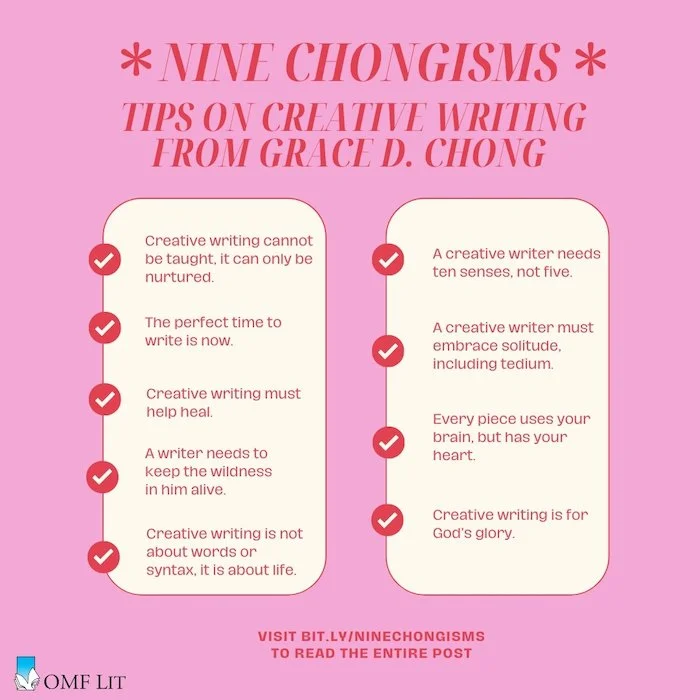Grace Chong: "Creative writing is honoring the light within me"
Every August, we celebrate #BuwanNgMgaAkdangPinoy !
We asked some of our authors for writing tips to inspire future generation of Filipino writers.
Check out the "Nine Chongisms" or creative writing tips from award-winning and best-selling author Grace D. Chong.
1) Creative writing cannot be taught, it can only be nurtured.
The gift is not the ability to write; it is the passion to write. You can’t be forced, or made to go to writing school and emerge a creative writer.
2) The perfect time to write is now.
How much writing are you doing? If you wait till you have more time, more money, or when you’re older, or more experienced, then kiss publishing good-bye. If you have stories to tell, tell them now. If you want to write, write now.
3) Creative writing must help heal.
I live and wish for happy endings. I believe that when this earthly life ends, God’s children will move to eternal life. I feel that each written work—be it for kids, adults, the world—must uplift a reader’s (or my) sagging spirit.
At some point in our lives, we hurt. Surely the human spirit has the capacity to bear pain and rise from it, but it can use a little help to hasten the healing process.
4) A writer needs to keep the wildness in him alive.
The wildness in us is our daring attitude, opinions and feelings which we call imagination—it can go where others don’t want to go. Imagination is circular, not linear. It can begin with any character or action at any point of your story.
It’s thinking out of the box, thinking in the box, thinking in another box, and thinking in new boxes. I guess it’s courageously trying out all kinds of boxes to weave tapestries of daily living.
5) Creative writing is not about words or syntax, it is about life.
Creative writing is looking for the good in people, reconciling differences and solving conflicts, in a unique voice that is yours alone—not preaching, just testifying.
6) A creative writer needs ten senses, not five.
Behind every sound, touch, scent, image, and taste is a story. Someone said that when a writer hears a whisper, he hears a thunder.
Creative writing is looking beyond the beauty in the ordinary. It’s seeing the buds bloom, enjoying the birds' chorus, hearing the leaves wail, re-reading the books that have inspired you and dipping into them. It’s feeling the texture of paint and the ouch of a needle.
7) A creative writer must embrace solitude, including tedium.
Creative work requires a good deal of time alone. Often, I need to withdraw from the hubbub of the world—and be with my shadow.
Enjoy the tedium. Go over a paragraph ten, twenty, fifty times until it sings.
8) Every piece uses your brain, but has your heart.
Everything we experience is in our brain. The challenge for a creative writer is to retrieve this information.
We use our heart to read others and through electrical impulses, pressure waves and hormones, our intuition enables us to feel empathy for others.
9) Creative writing is for God’s glory.
Creative writing is honoring the light within me, letting it shine, to glorify its Source. It is baring what chaos and choices have taught me, so others may find their own light.
To read the entire post, you can visit her blog https://bit.ly/ninechongisms
About the author:
Grace D. Chong has written more than 40 books for children. She has won six Palanca awards, four of them first prizes, and a Gintong Aklat award. Grace was also a finalist in the National Book Award and the Catholic Mass Media Awards. She holds
degrees in Speech and Drama (University of the Philippines),Mass Communications (Columbia College, USA),and Fine Arts (Chicago Art Institute). Visit her
blog at leavesofgrace.blogspot.com.


